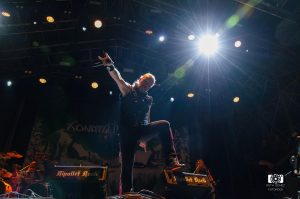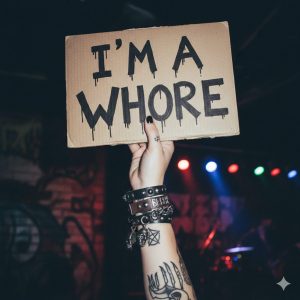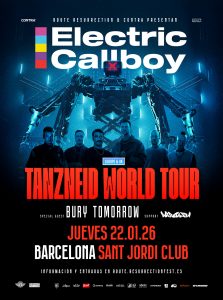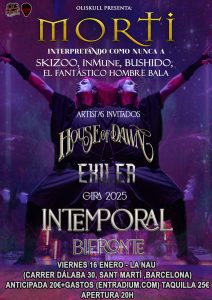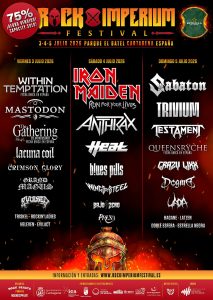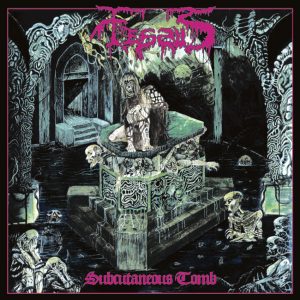TOWER: Rage Against the Collapse: Metal, Resistance, and the Darkness Ahead

With Let There Be Dark, Tower unleashes an album that feels like both a warning and a battle cry. From confronting political turmoil and patriarchal oppression to capturing the relentless, chaotic pulse of New York City, the band refuses to hold back. Vocalist Sarabeth Linden takes aim at the industry’s obsession with labels like “female-fronted,” while guitarist James Danzo channels the anxiety of a world teetering on the edge. In this interview, Tower reflects on the state of heavy metal as a force of rebellion, the threats looming over society, and why music remains one of the last true acts of defiance.
Hey, thanks for your time! You’re about to drop Let There Be Dark—how do you feel right now? Is it excitement, exhaustion, or a little bit of both?
James: We just got home from tour and are still a little jet-lagged, but excited more than anything!
Tower’s music has always carried a kind of restless energy, like a street preacher screaming that the end is near. But what’s the real apocalypse for you? What’s the thing looming over us all that should have people screaming in the streets?
Zak: History repeats itself often in dangerous ways. It’s important to learn from the pitfalls of the past.
Your music taps into this raw, feral power—unapologetic, full-throttle. But the world doesn’t always make space for that, especially when it comes from women. Sarabeth, you’ve spoken about the music industry’s obsession with labels like «female-fronted»—which, in itself, feels like a way to keep things in a box. Do you ever see that changing? Or will the industry always be trying to contain what it can’t control?
Sarabeth: With Trump and the patriarchy still in power, I hardly see anything changing without a full-on war. I think it’s important, especially if you are a cis man or even a patriarchal woman, to inform yourself about the damages, limitations, and restrictions that have been created for minorities and reflect on why. If you’re still using the term “female-fronted” as a genre or a label, then you have a lot to think about. And if you feel entitled to other people’s bodies and space—especially a woman’s after she plays a concert—then you really need to learn what boundaries and consent mean.
New York is a beast of a city, and you’ve got that unmistakable NYC grit in your sound. How has the city shaped you—not just musically, but in terms of how you see the world?
Zak: NYC is its own being, living and pulsing with its own moods and good days and bad days. It’s a real character.
James: NYC is more of a cosmopolitan city than a typically American one. It’s a true melting pot and a cross-section of all cultures and ideas. Not everyone from NYC is open-minded, but it certainly gives you the opportunity to learn and adapt.
Let There Be Dark has this ominous weight to it, both musically and lyrically. There’s almost a sense of doom, but also resistance. Does this album reflect how you’re feeling about the world right now?
James: Of course. Things are scary both at home and abroad, with maniacs wielding absolute power and lobbing threats and bombs like footballs. Rome is burning, so we grabbed a fiddle.
The U.S. feels like it’s constantly on the brink of something—whether it’s political division, corporate decay, or just straight-up collapse. A lot of classic metal, from Sabbath to Priest, was born out of working-class frustration. Do you think metal today still has that same rebellious, counterculture spirit? Or has it been diluted?
James: Metal has become a familiar element in society, but it wasn’t when Sabbath and Priest were starting. Back then, it was more of a statement and a risk for them to do what they did. But rock and metal are basically a rebellious attitude distilled into sound. You’ll never change that.
A lot of your music, especially on Shock to the System, has touched on themes of loss, instability, and personal reckoning. How much of Let There Be Dark is born from those same anxieties? Or is it coming from a different place this time?
James: A couple of tracks on Shock are like that—«On the Line» and «In Dreams», in particular, are a bit heavy lyrically. This album expands on that a lot more. Every song is either about loss, death, or the threat of one or both. We live in a realm of permanent uncertainty, and that continues to be reflected in our music.
Metal has this reputation of being all bravado and machismo, but at its core, it’s also about catharsis—about giving voice to things we can’t always express. What’s something you’ve been able to say through your music that you might not have been able to otherwise?
James: Writing lyrics makes you think differently—to say something in a way that leaves room for personal interpretation. I’m a pretty straightforward person, and I have to change that somewhat while writing lyrics. It’s a nice challenge!
You’ve played all over the world, from Pyrenean Warriors to Up the Hammers. Have you noticed any stark differences in how metal communities operate in different countries? Are there places where the energy just hits differently?
James: We’re just getting to know the differences between audiences in certain parts of the world. There are a lot of countries where we’ve only played one or two shows, so it will take more time to really gauge things. U.S. crowds are totally unpredictable. European crowds, on the other hand, are reliable and dedicated—even if they show it in different ways.
Finally, what’s next for Tower after Let There Be Dark? And what’s one thing you hope people get from this album?
James: I hope they like it enough for a second spin! I hope people can relate to the feelings and the words and establish some connection through it. It’s just cool to be able to release some music and let it land where it lands. We are grateful for any kind of interest in what we do! Thank you!


